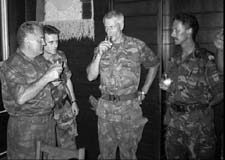


Stage 4 - Tracks Peacekeepers
Related IssueDutch Peacekeepers
Articles: "A Cautionary Tale for US Before It Enters Bosnia"
In the Netherlands, the home of the peacekeepers assigned to guard the civilians massacred at Srebrenica, the mere mention of the former Muslim enclave still inspires anguished questions. Despite long parliamentary debates, many Dutch complain that they don't know what exactly went wrong. But in the Netherlands and elsewhere, the episode has come to be called the worst war crime in Europe since the Second World War.
Jan van Benthem, executive producer of "2 Vandaag," a current affairs TV program in Holland, has continuously followed investigations on the role of the Dutch peacekeepers. Explaining Holland's obsession with the issue, Van Benthem says, "It's a national trauma for us. We still feel responsible for the deaths of Srebrenica."
van Benthem also defends the Dutch peacekeepers, however. "It is clear that our lightly-armed soldiers were unable to guarantee the Muslims' safety in Srebrenica. Their mandate was only to observe. They were peacekeeping troops, not peace-enforcing troops and simply didn't have the arms to protect the Muslims of Srebrenica," he says, adding, "However, after their requests for military support were refused by the UN, our soldiers should have left, just to avoid further responsibility and involvement in the massacre."
Follow-up: What's happened since 1995
Since David Rohde's article appeared in The Christian Science Monitor in October 1995, Dutch reporters have meticulously researched the role of Dutch politics in the Srebrenica case. Their publications led to an extensive public debate, several investigations by the Dutch government, parliamentary inquiries, the installation of parliamentary investigating committees, and many reports.
November 1999: UN report on Srebrenica. Secretary-General Kofi Annan presents the report to the Security Council. It finds that the peacekeepers had done too little to protect the Muslims. The UN further recognizes that it too failed in Srebrenica. However, there have been no consequences for UN staff.
Dutch television broadcasts footage that reveals more about the relationship between the Dutch peacekeeping commander, Lt. Col. Ton Karremans, and Bosnian Serb military chief Ratko Mladic.

Bosnian Serb army Commander General Ratko Mladic, left, drinks toast with Dutch U.N Commander Ton Karremans, second right, while others unidentified look on in village of Potocari, in this July 12 1995 file photo. Karremans gave a testimony at the Yugoslav War Crimes Tribunal in the hearings against Bosnian Serb leaders Radovan Karadzic and Ratko Mladic, Wednesday July 3, 1996. AP: PHOTO/STR
The video, bought in Serbia by the Dutch current affairs program "NOVA," shows Mladic threatening Karremans, but it also reveals that the Dutch officer bid Mladic a warm farewell, and did not choose to refuse gifts from the Serbian general on his departure from Srebrenica. The picture to the left shows the two from 1995.
December 1999: Rumors grow that the Dutch Immigration and Naturalization Service is about to start forced deportations of Srebrenica survivors who had found refuge in Holland. A group of Dutch civil rights organizations starts a campaign to prevent this. As a result, Srebrenica Muslims are given the right to stay in Holland and granted full refugee status on February 9, 2000.
December 2000: The Dutch government orders a formal investigation of the Srebrenica massacre and the involvement of the Dutch peacekeepers by the National Institute for War Documentation, which until now had concentrated on WWII. The results are to be presented to the Dutch public and the government.
Spring 2000: The Association of the Mothers of Srebrenica hands in a complaint to the International Criminal Court of the Former Yugoslavia in The Hague, asking the Tribunal to investigate the role of high-ranking officials in the UN, the Dutch government, and the Dutch army.
April 19, 2001: Two Dutch officers testified at a parliamentary inquiry that the French commander of UN peacekeepers, General Bernard Janvier had refused repeated requests for air strikes against Bosnian Serb troops. This, the Dutch officers said, allowed the massacre to be carried out unchallenged, according to Agence France-Presse.